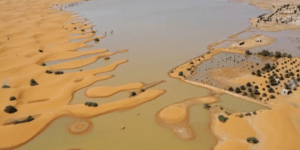Sahara Desert Floods for the First Time in 50 Years
Southeastern Morocco experienced severe flooding in the Sahara Desert due to heavy rainfall, surpassing the region’s annual average. The village of Tagounite recorded 100mm of rain in just 24 hours, leading to the refilling of Lake Iriqui after 50 years. Experts warn of potential climate changes in the region, with increased moisture retention and more frequent storms.
CONTENTS:

Sahara Desert Floods for the First Time in 50 Year
Sahara Desert floods
Sahara Desert Floods for the First Time in 50 Year: For the first time in over 50 years, the Sahara Desert has experienced severe flooding following two consecutive days of heavy rainfall in southeastern Morocco. This rare weather event transformed the normally arid landscape of the area. The regions around Tata and the village of Tagounite, located about 450 kilometers from Morocco’s capital, Rabat, are among the hardest hit.
Tagounite record rainfall
Sahara Desert Floods for the First Time in 50 Year: In just one day, Tagounite recorded 100 millimeters of rainfall, surpassing the yearly average for many surrounding regions. This deluge took place in late summer, a time when rain is exceedingly uncommon in this part of the world. As a result, Lake Iriqui, which had been dry since 1925, was filled for the first time in nearly 50 years. Satellite images vividly captured the transformation, revealing a striking water landscape set against the backdrop of desert dunes and palm trees.
Sahara rainfall climate change
Sahara Desert Floods for the First Time in 50 Year: Meteorologists describe the rainfall as an extremely rare occurrence and suggest it could signal shifting climate patterns in the region. Experts like Houssine Youabeb from Morocco’s meteorology office noted that such intense rainfall hasn’t been seen in decades. The storm’s aftermath points to an increase in atmospheric moisture, which could lead to more frequent extreme weather events in the Sahara.
Impact on agriculture and communities:
While the rain provided much-needed relief after a prolonged drought for local farmers, it also caused widespread destruction, killing at least 18 people and damaging crops in various parts of the country. In response to the disaster, the Moroccan government has launched emergency relief efforts, particularly in areas still recovering from last year’s earthquake.
Sahara flood climate change
Sahara Desert Floods for the First Time in 50 Year: In a rare and dramatic weather event, southeastern Morocco experienced severe flooding in parts of the Sahara Desert after two days of torrential rain. The rainfall exceeded the region’s annual average, creating an unusual and intense situation for the typically dry landscape. The village of Tagounite, situated 450 kilometers south of Morocco’s capital, Rabat, saw a remarkable 100mm of rain in just 24 hours in September, far surpassing the expected precipitation and disrupting the region’s typical weather patterns.
NASA satellite images revealed that Lake Iriqui, a dry lake bed between Zagora and Tata, was refilled by the heavy rainfall after remaining dry for 50 years, marking a significant environmental shift in the area. Experts identified the event as an extratropical storm and warned that it could be an indication of long-term climate changes in the Sahara, with rising temperatures increasing moisture retention and possibly leading to more frequent storms and faster evaporation cycles.
The floods, which hit areas still recovering from the previous year’s earthquake, claimed 18 lives and led to rapid refilling of dammed reservoirs in southeastern Morocco. Spanning over 9 million square kilometers, the Sahara Desert is increasingly threatened by extreme weather events tied to global warming. Scientists warn that future storms of this scale could become more common as rising temperatures intensify the region’s unpredictable hydrological cycle.
Check out TimesWordle.com for all the latest news
You must be logged in to post a comment.